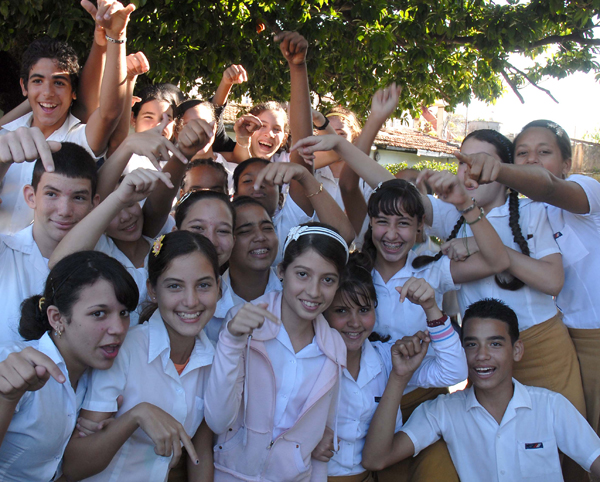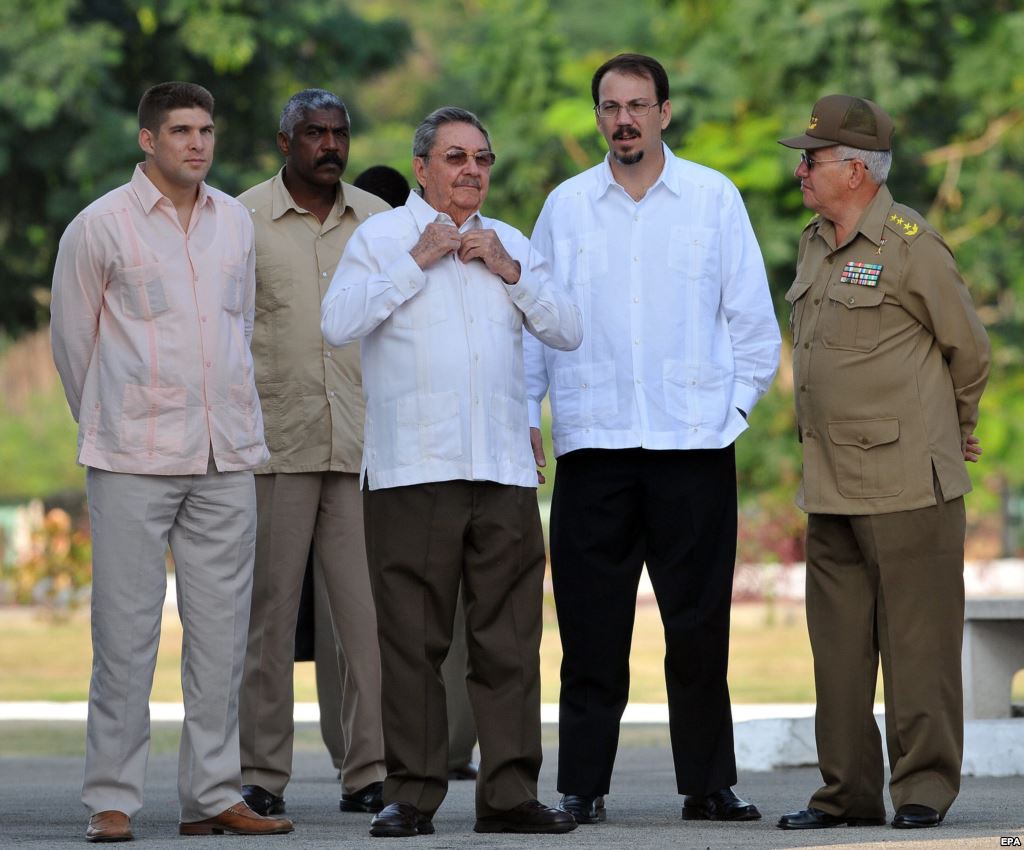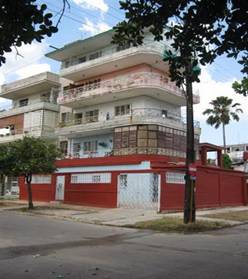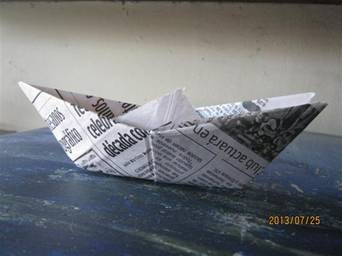Soy Yogurt Meant for Children Ends Up Feeding Pigs / Moises Leonardo Rodriguez
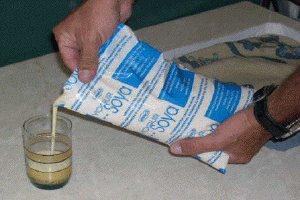
ARTEMIS, Cuba, Moises Leonardo Rodriguez — Soy yogurt, the sale of which is regulated and intended for children, was received in a spoiled state over the last two weeks in the outlets in the town of Cabañas. In the city of Mariel in the Artemisa province, in contrast, the opening of a new production plant for yogurt destined for Havana and Mayabeque provinces was just announced.
The regulated amount is three one-liter bags a week for every child between 7 and 12 years, replacing cow’s milk, the sale of which is restricted to children under age 7.
Many believe that the priority should be to ensure the technical means so that the product arrives in good condition, before producing more.
Ileana de los Ángeles Iglesias, speaking from Central Havana in the capital, said that the bags bought off the ration book in recent weeks were also spoiled.
A nutritionist, speaking on a recent National Television News broadcast, said that the product should be stored at 2 to 8 degrees Celsius, which appears to explain the deterioration of the yogurt during its delivery in unrefrigerated vehicles in hot weather months, as well as in the warehouses and places of sale.
On 11 August, the yogurt was sold outside the rationing system and a group bought dozens of bags to be fed to pigs, while the children are left waiting for a solution.
Cubanet, August 15, 2014 |
Cholera Situation Worsens in Ciego de Avila / 14ymedio
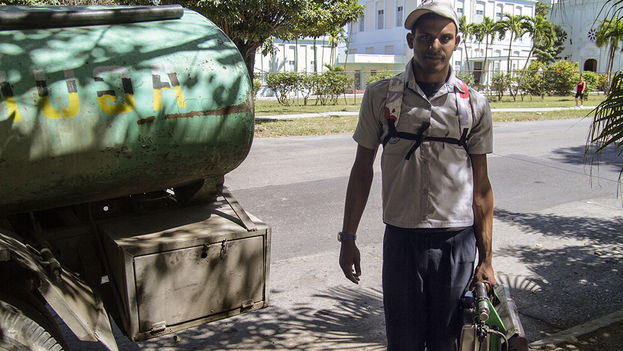
14YMEDIO – An increase in the number of patients hospitalized for cholera indicates that the unfortunate epidemiological situation in the province of Ciego de Avila is worsening, causing alarm among the population.
After several months of experiencing the illness in this territory, “the last two weeks have seen a growing number of people infected,” according to a small article appearing on the last page of the provincial weekly Invador, under the title “Increase in Cases of Cholera,” written by Moisés González Yero.
Fernando Bravo Fleites, director of the Provincial Center of Hygiene, Epidemiology and Microbiology, states that currently contagion is found in at least 19 places in the province and says that the most critical municipalities are Primero de Enero, Majague, Florencia, Venezuela and Morón.
One of the latest steps has been the temporary closure of the The Charcazo campground in the Primero de Enero municipality.
In an unusual request that is evidence of the decline in the quality of life, the director of the Provincial Center of Hygiene advises Avilanians to redouble “the attention to drinking water that is adequately clean.”
Health authorities also “call on people not to defecate in the open, an act that represents a great danger of disease transmission and, in cases like the present, is a violation severely punished by law.”
Alan Gross: Trapped in a Cold War Tale / Ivan Garcia
In the Zamora neighbourhood, next to the Carlos J. Finlay military hospital, in the Marianao Council area, in Eastern Havana, many of the neighbours don’t know anything about the background of Allan Gross, the US contractor, who is stuck there.
It’s a poor district, with little houses, dusty streets and broken pavements. The midday heat finds it deserted. Not even the street dogs can bring themselves to walk over the hot asphalt.
People there take shelter from the mid-day sun inside their houses, or, inside a bare private cafe, put together in a house entrance hall, they talk about the latest TV serial, José Dariel Abreuthe’s 31st home run with the Chicago White Sox, or Barcelona’s next sign-ups.
Around here is where you find out about the latest violent crime which happened the previous night and, if the person you are talking to trusts you, he’ll take you round to the house where one of the neighbours will discreetly sell you some trashy industrial bits and pieces and Chinese cell phones. continue reading
People don’t know Alan Gross, who is kept in a cell in the hospital, just a stone’s throw from the neighbourhood. As far as Ernesto, one of the neighbourhood kids, is concerned, he has heard the name somewhere. “He’s the gringo who they locked up for spying in Cuba”, he says, but he doesn’t know any details of the case. Another kid, who shows off about being well-informed, tells some of the details:
“I found out on the antenna that the American has staged a hunger strike and he says that, dead or alive, he’s going to leave this year (the antenna is an illegal construction — usually made of a metal tray and some Coke cans — and is used as a communication medium in many poor Cuban poor neighbourhoods). I don’t know why Obama doesn’t exchange him for the “three heroes” (Castro spies in jail in the States).
That is what the Cuban man-in-the-street — many of them — know about Gross, the contractor. A spy who came from the north to subvert things on the island.
Not many of them know what it was that he tried to bring into the country. And, when they know that Alan Gross had with him in his briefcases and backpacks two iPods, eleven Blackberrys, three MacBooks, six 500GB discs, three BGAN satellite phones, among other things that Castro’s government considers “illegal,” they look a bit stupid.
“But they sell all this stuff on Revolico (an on-line site condemned by the government). What was the Yank up to, setting up a spy ring with commercial toys,” is what Arnold says, smiling (he is the owner of a little workshop that fixes punctures on your bike or car).
The crime that the olive green State accused him of: “assembling parallel networks to gain illegal access to the internet,” is only an offence in countries with eccentric laws like Cuba or North Korea.
The official media, sporadically offer brief comments, edited in a cleaned-up kind of style, by the hacks at the Foreign Relations Department, who disinform, rather than inform.
People hear about it in the news on the radio and television and it is the main news item in the newspaper Granma. And it all backs up the Cubans’ opinion that Alan Gross was caught carrying out espionage.
Cuba is a nation that scatterbrained foreigners do not know. There are two currencies and the one which is worth more is not the one they pay to workers.
The press assures us that five decades ago they “got rid of prostitution and other capitalist scourges”, but an elderly foreigner on a beach receives more sexual proposals than Brad Pitt.
In order to understand the story put together by the Havana government’s communication experts, we need to have in mind one of its key features: from 1959, the United States is the public enemy number one.
Everything bad stems from that. Six hundred supposed attempts on Fidel Castro’s life: from planning to assassinate him by a bullet through the temple, to injecting him with a strong poison which would make his beard fall off.
The eleven Presidents who have occupied the White House during Castro’s 55 years are far from being angels. They have hatched attacks, subversions, and assaults on the first Castro. But the regime exaggerates them.
In that context, Alan Gross was a useful pawn for the island’s special services. Gross visited Cuba four times with the idea of giving unrestricted internet access to the small local Jewish community.
On December 3, 2009 the US contractor was sentenced to 15 years in jail by a Cuban tribunal. Gross was not the “stupid innocent taken in by USAID,” as they said at his trial.
He was aware of the risk he was running bringing in information equipment into a totalitarian nation, where parallel communication is a crime against the state.
According to a 2012 article from the AP agency, the reports about his trip indicate that Gross knew his activities were illegal, and he was afraid of the consequences, including possibly being expelled from the country. One of the documents confirms that one of the community’s leaders “made it absolutely clear that we are playing with fire.”
On another occasion, Gross commented “There is no doubt that this is a very dangerous business. It would be catastrophic if they detected the satellite signals.”
It would be possible to appeal to Raúl Castro’s government’s better nature, asking that they set free an unwell 65-year-old man, who is mentally “out of it,” following the death of his mother the previous 18th of June in Texas.
But the criollo (Cuban) autocracy in playing its own game with the USAID contractor. There are still three spies from the Wasp network locked up in US jails, two of them on life sentences.
Alan Gross was the perfect pretext for a negotiation which the Obama administration finds morally unacceptable, as it would place the elderly Jew on the same level as the Cuban spies.
Gross is an authentic laboratory guinea pig, stuck between the United States’ ambiguous politics and Castro’s attempts to get his agents back home. An exchange which the White House is unwilling to accept.
Iván García
Photo: Alan Gross (b. New York, 1949), before his detention, and now, although he is probably thinner and weaker after his last hunger strike and his depression over his mother’s death last June 18th. Taken from The Cuban History.
Translated by GH
10 August 2014
Fiesta and Funeral / Juan Juan Almeida
Starting on the morning of Tuesday August 12th, we have the International Youth Day celebrations all over Cuba; but, in view of the fact that, in the words of José Ángel Maury, who is responsible for the UJC (Young Communist League) International Relations, “We have the happy coincidence that it takes place on the eve of the Commander-in-Chief Fidel’s birthday,” the climax will be a huge chorus of Cuban young people and artists singing Happy Birthday Fidel at dawn on August 13th.
And if that doesn’t seem enough, in order to make it up to three, the communist organisers have contrived to combine the festivities of the 12th with the “Yes I have a Brother” day, to commemorate the 60th birthday of the dead President of Venezuela, Hugo Chavez, and Fidel’s 88th. It seemed to me I was hearing my talkative grandmother when she said “If anyone doesn’t like soup, they give him three cups of it.”
Translated by GH
12 August 2014
Freedom: Not AP, Nor USAID, Nor Investments, Nor Cardinal, Nor Reforms, Nor Castro / Orlando Luis Pardo Lazo
Between the Keffiyeh and the Kippah / Fernando Damaso
In recent weeks the Palestinian issue, and specifically what is happening in the Gaza Strip, has captured the attention of the media. Over here the image shown is that of poor peaceful Palestinians attacked and brutally slaughtered by the bellicose Israelis.
Violence is good for no one and should be avoided, because it only causes pain, suffering, destruction and death, wherever it comes from. The solution of settling differences and contradictions through peaceful means has always been more intelligent, although it is much more complex. Unfortunately, in the Middle East historically, that has been very difficult if not impossible. This land has been prodigious in expulsions, returns and new expulsions. The blame is equal on all sides. continue reading
As long as it is not accepted that two nations with different customs, cultures and religions can live in the same territory, peacefully and with mutual respect, there will be no solution and the victims of both sides will continue to increase, because the impact of a Palestinian rocket on Israel is lethal, as is an Israeli bomb dropped on Palestine. Both kill and both kill adults, old people and children of both sexes equally and without discrimination.
The reality is that during the many years that the Israelis have been working tenaciously to live in a civilized way on the arid ground beneath their feet, the Palestinians have been engaged in war not only in this region but in other regions of the world. The examples of their combatants enrolled in foreign wars are well-known, although they try to hide it.
Today the Palestinian economy doesn’t exist because it has never been created and the majority of its resources come from Israel, where thousands of Palestinians flock each day to work in the companies and factories, or to provide various services. Israelis need peace to continue to develop and so as not to have to spend so many resources on armaments, but the Palestinians also need peace if they want to survive as a people and a nation.
To achieve this it is essential to stop fanatically following so many fundamentalist messianic leaders whose only objective is to maintain themselves in power on the pedestal of martyrs.
The images of Palestinian children confronting Israeli tanks with stones has been spread far and wide and has been cleverly used as propaganda, while hiding the image of the Palestinian rockets falling on Tel Aviv and other cities along with the bombings in malls, discotheques and public transit, as well as the kidnappings and assassinations
The cause of a helpless victim confronting a powerful aggressor, despite the years, still generates sympathy, but the terrible thing is that there is much that is false and confusing in that image.
11 August 2014
A Troubling Harbinger of Cuba’s Future / Juan Juan Almeida
It was all much easier when we did not have names for things and you simply had to point with your finger. Back then, the difference between “this” and “that” was merely a gesture. But with the advent of letters, words, paragraphs and know-it-alls it is now more difficult to describe with any precision what the future Cuban landscape will look like.
Throughout our history we have all wanted the same thing: a lasting change that will bring about what is best for Cuba; a pluralistic, diverse, democratic country brimming with happiness. It is worth remembering that it was for this that young men fought one August 4 — on a day like today but in 1955 — in a failed assault on the Presidential Palace. But back to the topic at hand, if things continue as they are now, this “yes but no” and “more of the same” will remain constant features of national life. It is not simply a matter of trying to express what we want but of achieving a better understanding of the way to go about it.
When I set aside emotion and rely on reason, I am saddened to see that the Cuban opposition — and I say this with all due respect — is inclined to reject social reality in favor of literary fiction. Yes, they are courageous people who risk their lives in the streets, but by pursuing parallel agendas and defending personal initiatives, they make it hard to believe they can coalesce into an alternative political force or become a significant or successful social movement which, at this point in time, could encourage unanimity. continue reading
This is not impossible but first they must acknowledge the overwhelming need to come together and organize themselves. More than a union, they must form a pact. Competing to demonstrate acquired leadership skills, as they now do, is like swimming in a make-believe desert to feed one’s ego. While this may be laudable, it does nothing to help one’s country.
Meanwhile, as time marches on, those on the island and those in exile express conflicting opinions. The kings of prevarication who currently make up Cuba’s governing clique are looking like heirs-in-waiting.
All indications are that — barring a miracle or a cataclysm, which are unlikely — Cubans will be presented with a souvenir: the imposition of a governmental succession that transfers power from the current office holders to their children, friends, in-laws, cousins and/or close associates.
But it is not I who is saying this. Sir Isaac Newton himself expressed it in his laws of motion and universal gravitation: “The apple does not fall far from the tree.” There are those who do not want to acknowledge this because they are too invested in a funerary transition, or because they spend their time being fascinated with themselves.
The heirs to power, the leading players, will almost certainly be family members of current leaders who already hold strategic positions, party officials who have amply demonstrated their loyalty, and military men such as Raúl Rodríguez Lobaina, Lucio Juan Morales Abad and Onelio Aguilera Bermúdez whose devotion was formed in the heat of battle in places such as Angola, Ethiopia and Nicaragua.
They are the new Caesars, people who, like water, have the ability to go around any obstacle and adapt to any circumstance. Their task will be to restructure the country, guiding it towards “who knows what.” They are certainly willing to fight to stay in power and one day Cubans — worn down by time and memory — will give in and agree to live in oblivion, allowing victims and victimizers to coexist. One fortunate aspect of a laboratory run by pirates is that, instead of eye patches and gold chains, they sport embroidered guayaberas and treat “the Fatherland” as their personal inheritance.
4 August 2014
Stubborn Like an Islander / 14ymedio, Reinaldo Escobar
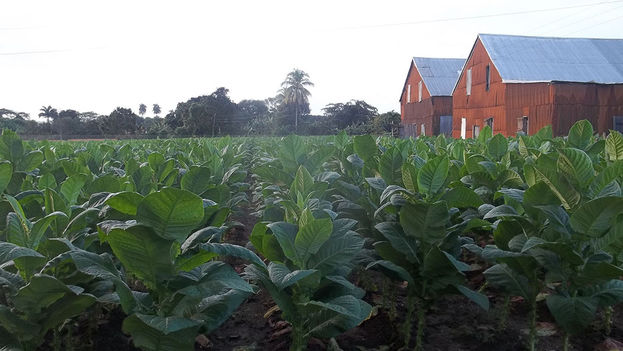
14YMEDIO, Reinaldo Escobar, Havana, 8 August 2014 – In the land of San Juan y Martinez, Bernabé Pérez Gutiérrez planted his first crops and fathered fourteen children. It was during the last years of the 19th century, and the immigrant baptized his farm The Islander, in memory of the Canary Islands where he’d come from. Today, his great-grandchildren are trying to keep one of the most important tobacco plantations in Pinar del Rio running, with the their great grandfather’s same stubbornness and his love for the furrow.
The Islander is a family cooperative inserted into a larger entity called “Rafael Morales Credit and Strengthened Services Cooperative (CCS-F),” consisting of 64 tobacco producers, occupying over 250 acres. It also includes dairy and pig farmers. Only ten of these farmers lease their land (under usufruct), while others jealously hoard their property titles.
What distinguishes The Islander is not only the quality of their tobacco, their fruit or their flowers, nor even the hard work of the members of the Pérez González family. Its hallmark is that this site has been, since the time of Barnabas an example of a sustained endeavor that refuses to be subjugated, neither by the misfortunes of nature nor the whims of the bureaucracy.
continue reading
The layout of the estate is also unique in the area. In 1955, Bernabé’s children built a shrine to their father, who was devoted to the Virgin of Charity. Their religious fervor reached the point where during a drought they organized a procession with the image of the Patroness of Cuba in order to summon the rains. Under the small belltower, the priests of the area have baptized and married many members of the family and their neighbors.
Family denounces the unjust relationship between the producers of snuff and state monopoly that sells
However, the greatest peculiarity of The Islander lies not in its enormous ceiba tree, nor in the small chapel, but in its people. In the current times, where being an entrepreneur and defending the autonomy of the farmers generates suspicion and incomprehension, the Perez Gonzalezes are known in the area for being “grumpy.”
In a country where the established leadership obeys and doesn’t question the powers-that-be, the progeny of that immigrant have had to overcome many obstacles. The family obstinately denounced the unjust relationships between the tobacco producers and the State monopoly that trades in it. Often it’s not about demanding new prerogatives, but demanding that the directors and agricultural officials meet the standards they themselves have set.
Sitting in the doorway, where a sweet breeze blows, some descendants of the obstinate Canary Islander started listing their demands. Bushy eyebrows one and all, they bear the unmistakable family stamp that marks them as stubborn. They relate that among the most insistent of their demands is questioning the calculations of the Tabacuba Company in determining the tobacco growers’ costs for each bushel of leaves. Included in the formula are inputs such as fuel, fertilizer and herbicides, plus adding the wages paid to the workers engaged in planting, cultivating and harvesting and selection of tobacco.
“Every year it’s more expensive, particularly the wages, because nobody wants to work for four pesos,” commented Alfredo Perez, the current head of the family. “However, the company seems to live in another dimension far from reality, and the data they use for what they call the cost sheet.” Times have changed and the costs of living have skyrocketed, but the agricultural bureaucracy continues without updating their old numbers.
With his hat in his hand, Juan Pablo, with a degree in agricultural engineering, complains, “As if it were great news that they now tell us they will pay a little better for every bushel of tobacco, but for every percentage point they raise the schedule, the costs go up six or even ten percent.”
The floor passes from person to person, until it is Nestor Perez’s turn; Nestor dreamed of being a lawyer but they expelled him from the “university for Revolutionaries” for being too confrontational. With regards to the problems of the company, the young man has realized that “when the specialist comes to determine the quality of our offerings, they find a lot of irregularities, and categorize as ‘affected’ a tobacco the produces ample dividends for the company. That’s where the farmer has to stand firm and not accept the impositions. Ultimately we are the ones producing the leaves and we have to learn to set conditions.”
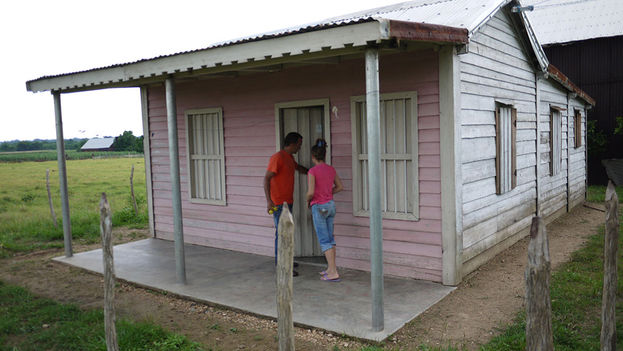
In the middle of the conversation, with the coffee cups now empty, another battle these farmers have waged comes up: the demand for proper electrification of the cooperative. In the late sixties they had provisional access to an alternative electrical line, installed illegally. This is what is commonly called a “clothesline” because it lacks adequate poles and transformers. Since then, and due to the increase in consumer appliances during the last 45 years, the low voltage affects not only domestic energy use, but also production. The Perez Gonzalezes have written letters to all the institutions involved and never stop raising the issue in public assemblies.
Technical problems directly affect performance. “There is a group of producers in the area who average over 15 tons of tobacco every year,” argues Nestor, while putting fruit in a basket. “With stable electricity we could reach 25 tons. We’ve proposed to the State that they open a line of credit for doing this work and we pay for it, but they haven’t accepted this proposal, which makes us think they they are intentionally trying to marginalize us for our way of thinking.”
Alfredo, the youngest of the family—but by no means the least tenacious—says that “although the cooperative is supposedly autonomous, in real life it is subordinate to the Tabacuba Company. For example, we’ve asked for disks for plowing, but when these items arrive, it’s the company that decides how to distribute them according to their own criteria. We can’t buy those any other way because there is no free market offering them.”
The oldest of the all the Canary immigrant great-grandchildren is named Ariel and speaks in direct sentences. While he’s talking, a lean dog with a sharp look sits under the chair where he is sitting. “The cooperatives were left without any batteries for their tractors,” says Ariel. “They have to sell them to us because we order them properly, but these are the things they do to isolate us from the rest of the cooperative. They say we’re a bad example.”
The afternoon advances, but the heat doesn’t let up. A part of the shadow of the great ceiba reaches the doorway. Juan Pablo summarizes the conversation with perfect clarity, “We know that in meetings where we haven’t been invited they warn the cooperative members that they should stay away from us because we are counterrevolutionaries. Someone always comes to tell us about it, because everyone knows that the only thing we want is to work.”
It’s time to go back to the fields, so the five men take up their tools and return to the furrows. Before saying goodbye, they raise one of the biggest pieces of nonsense they have to deal with. “For a farmer to receive a document of ownership for their home, they first have to donate to the State what they built with their own efforts and resources. And so then the State charges you for what you gave it. If you don’t give them the land, you can’t build your house legally.”
The New Gold Rush / 14ymedio, Yoani Sanchez
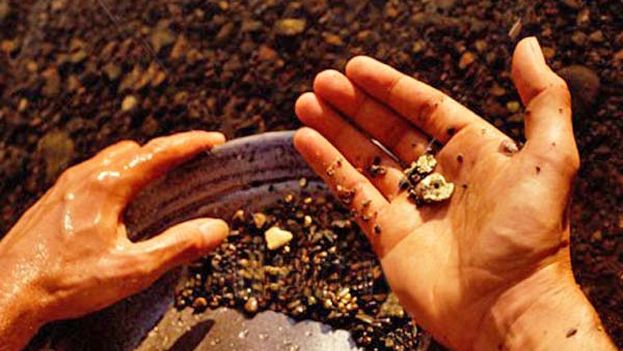
14YMEDIO, Yoani Sanchez, Havana, 13 August 2014 – Evening falls and the sound of the sieves in the rolling hills trails off. The three men collect their belongings. They’ve finished the first day in their arduous search for gold. Tomorrow they will wake up early and with the first light of day return to dig, wash, sift and find the little nuggets among the mud and sandstone. “If I find at least one gram, I’m going to finish the roof of my house,” says the most experienced of the stealth miners.
The Rafael Freyre area in Holguin province attracts hundreds of people every year who dream that a mine will help them out of their economic difficulties. Is it need? A hobby? Or a real gold rush? Everyone experiences it in their own way, but the oldest people in the area say that when “people have gold in their eyes it’s like a demon that will never leave.”
The stealth miners have created their own working tools from few resources. Among the most important is the “car,” a sieve with a piece of rubber where the mud is deposited, that then falls through the screen. It is a team effort, requiring at least three strong men. While two shake the sieve, the other pours water over the mud collected in the excavations. “Then the gold dust is left, in particles like a kind of pea hull, although there can also be nuggets,” says Fernando Ramón Rodríguez Vargas who lives in Levisa, Mayari municipality, and for years has dedicated himself to the pursuit of the precious metal.
Those who spend a lot of time in these tasks have developed and eye for finding where the gold is, they don’t believe in metal detectors. “They aren’t very effective because they go off everywhere, in this area there can be a little piece anywhere. The most commonly used method is the same as it is used by industries. I take a sample of the dirt and I wash it to check how much gold it contains just so I will know if it’s worth the trouble,” Veredia Elcok says, revealing his secrets. He has participated in numerous fortune hunting expeditions. He claims that the Cuatro Palmas area in Holguin is the most famous for the size of the pieces found, and because the gold “is at ground level.” continue reading
The second day of work is when your bones ache more. So the three men bathe in a creek early in the day to relieve the little punctures all over their bodies, and resume their excavations. The main symptom of “gold fever” is working and working almost to the last light, without eating. They go along making holes, because they aren’t in an area of surface tailings, the layer is deeper. The gold itself marks the path to follow, from the amounts they come across.
At one point they detect another group of searchers. That can cause problems, quarrels and strong competition.
Everybody wants to take your seam, then they start to dig deeper around the hole and come in from underneath,” says Verdecia Elcok, who has dug with several friends and neighbors working together. You have to go faster, the hands sinking full speed into the earth and the sieve never stopping its “swish swish swish.”
The technique for finding a seam is to test and test. Consistency is key to this work, and perhaps because of this the stealth miners take on an obsessive look, incapable to letting themselves be deterred by defeat. Normally they look for the tracks of rivers that no longer exist. They’re like scars in the hills where water would have once swept along the mineral. There are also muddy areas on the banks of still running rivers that are good places for findings.
The third working day. The bread they brought is full of mold because of the humidity. On getting up, the three men have numb hands, and the skin on their fingers is cracked. Every muscle aches, but they have to keep going. Perhaps today will be their lucky day. The first hours on the site they work with more energy, but exhaustion returns and slows the pace as noon approaches. The whole time their feet are damp with the water flowing through the “car.” One hurt his hand another coughed all night. Around lunch time a 0.8 gram nugget restores their hope and they decide to continue.
They’re picking up tiny pieces, or “lice” as they call them. They hope to have a breeze to start the melting. One brings a little mercury. They put it in a pot and apply heat. It gives off a poisonous gas and the men stand upwind to avoid breathing the smoke. It’s a dangerous process, but almost magical. In the bottom of the vessel the gold gleams. Every 24 carat gram they sell will bring a price of between 25 and 27 convertible pesos, a little more than a dollar.
Gold fever can also become gold death. Verdecia Elcok knows this well. “Over in the La Canela area a lady—they call her Mimi—found the largest piece of the mineral ever found in that area, four-and-a-half-ounces. Now the woman has developed cancer from using so much quicksilver.” The mercury is taken from state industries, diverted from laboratories and chemical plants. It is a product that should be controlled, but it hits the streets and gets into the hands of miners and jewelers.
A lady found a four-and-a-half ounce piece. Now, she has developed cancer from using so much quicksilver
If they get lucky, the three “seekers” will have to be cautious. If they’re seen to be spending a lot of money in town, people will start to investigate where it came from. Someone could follow them to their place and find the exact site of the mine they’ve found. Everything has to be handled with a lot of discretion. There is also the danger of the Forest Guard, which imposes fines of up to 1,700 pesos. According to the Mining Act “the subsoil is the property of the State, the only entity authorized to extract minerals and to exploit it for research purposes.”
However, the State isn’t interested in many of the small deposits. The costs of exploitation would be greater than the earnings, so it isn’t done.
Sometimes it is not gold that glitters. “I have found old coins and indigenous remains,” says Rodríguez Vargas. The biggest frustration for those who pick through these hills is having to leave the area with no results.
Gold fever infects everyone equally, regardless of age, gender or education. “You can find a doctor who, in his spare time, is on the bank of the river, a teacher, a young student, a pregnant woman or one with a kid,” says Verdecia Elcok. “Because in the end it’s just like the fisherman, who always has to return to the sea.
The official institutions categorize these miners as a real “invasion of prospectors.” They accuse them of harming the environment, especially the topsoil because they remove and wash it. The streams and water reservoirs of the area are also affected by turning over and carrying the sediments. Verderia Elcok admits that “the waters are polluted and the farmers’ animals have fallen in the holes that are dug. There have also been accidents in the area, but this is a question of necessity, not avarice.”
A study by researchers at the Institute of Geology and Paleontology concludes that the “organization of this activity under business structures including State, cooperative and self-employed,” should be encouraged. The report suggests “local governments should provide the knowledge and power necessary to enhance the usefulness of the rocks and minerals present in their regions.” However, for now, the decision whether or not to exploit a site depends exclusively on the highest levels of government.
The days of searching are over. The stealth miners return home. They will return to the hills in a couple of weeks. The youngest of them sold his refrigerator to buy a half liter of mercury. “You’ll see, the next time we’ll find more gold and even a pirate’s treasure,” he says with the golden glint in his eyes that everyone in the area knows very well.
A Repetitive Hack / Fernando Damaso
With regards to the Cuban hack living in Miami, I’ve decided not to write any more, but it seems that drinks were passed around (in a letter he declared his love for them) and in one of his last writings he dismisses representative democracy.
He complains that in the United States you can’t but a business wherever you want, it has to be in a commercial area. That you are subject to inspections, forced to follow regulations and ordinances. You have to pay taxes. You can’t paint your house whatever color you want or put up fences without authorization. You have to have a permit for a rally or protests, and journalists can only publish what newspaper owners approve.
The hack seems to want to practice anarchism in an organized society. From his arrogance he asserts: Cubans don’t understand anything about this, they haven’t the least idea about the implacable et cetera.
It seems that this gentleman, when he travels to Cuba to deal with his work and have a little fun, hasn’t realized that here, after some time and overcoming the anarchy stage of years back, there are also all the regulations he criticizes and much more, and they are enforced through big fines, demolitions and even seizures without it being a democracy, much less a representative one.
On the subject of protests and demonstrations it’s more radical; they are forbidden and, if you hold one, you will be severely reprimanded by the authorities.
In the case of the press it’s simple: all the media are state-owned and the only articles approved by the authorities appear in them.
I think the hack knows this well, since he writes for one.
I don’t know how much they pay him for his weekly diatribes on the same topic: how bad it is living in Miami. Nor do I know if he is paid in dollars or Cuban Convertible Pesos, but it would be nice if he would be a little more serious, and stop thinking that we Cubans over here are stupid enough to believe what he writes.
28 July 2014
New Alliance Between Dissident Groups / 14ymedio
14YMEDIO, Havana, 12 August 2014 — The Patriotic Union of Cuba (UNPACU) and the Pinero Autonomous Party (PAP) formalized an alliance Monday in Santiago de Cuba.
Speaking to 14ymedio, José Daniel Ferrer, executive secretary of UNPACU said that both organizations share a commitment to strengthening the activities of the nonviolent struggle and invite smaller groups to join the alliance.
The Patriotic Union of Cuba is the now largest and most active Cuban opposition group. Started in 2011, the organization brings together more than two thousand members in the East, says Ferrer. There would be a similar number in the central and western areas, according to UNPACU’s own estimates.
The merger with PAP was based on the Declaration of Altamira—a reference to a region of Santiago de Cuba—whose key points include the autonomy of those who join UNPACU, collaboration in the training of members, and dissemination of activities that are undertaken together.
The trend to consolidate alliances and agreements among the Cuban opposition has accelerated in the past two years under the leadership of the Patriotic Union. The most important of these confluences happened last year with the merger of the United Antitotalitarian Front (FANTU), represented by Sakharov Prize winner Guillermo Fariñas, and UNPACU.
RWB Exhorts Cuban Authorities to Clarify Angel Santiesteban-Prats’ Situation
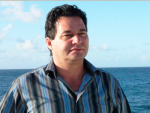 Published Wednesday, August 6, 2014
Published Wednesday, August 6, 2014
Cuban writer and blogger Angel Santiesteban-Prats disappeared from the jail at San Miguel del Padron on July 21, 2014. Authorities at first said that he had escaped; nevertheless, ten days later his daughter managed to speak with him briefly at a police precinct. His whereabouts are still unknown.
After having denounced the disappearance of Angel Santiesteban-Prats from the jail where he had been since April 2013, his relatives are worried about the accusation of attempted escape.
They have not yet been able to learn the Cuban writer and blogger’s version, but his family suspects that this new complaint is unfounded and its only purpose would be to increase his sentence to captivity. continue reading
The only person who has been able to see Angel Santiesteban-Prats since his disappearance has been his daughter. The interview only lasted ten minutes and was in the presence of a police agent; during this time the father, therefore, had no opportunity to speak freely. Since the said encounter occurred, the authorities have reported nothing about the writer’s situation, and rumors grow.
“Reporters Without Borders exhorts the Cuban authorities to explain clearly the current situation of Angel Santiesteban-Prats,” said Camille Soulier, head of the Americas’ Office of said organization. “The risk increases for the blogger each day that passes without news of him. We demand his immediate liberation and the withdrawal of all and each of the accusations brought against him. The repressive methods of the Cuba regime increasingly resemble those days of the ’Black Spring.’”
It has been more than a year since the author of the blog “The Children Nobody Wanted” found himself behind bars by virtue of his ostensibly critical position towards the Cuban government. In December 2012 after an expedited trial he was found guilty of “home violation and assault” and was sentenced to five years in prison. In April 2013 he was transferred to the prison center of San Miguel del Padron where he suffered torture and mistreatment.
His recent disappearance conincides with an interview given by his son last July 15 on Television Marti, a news channel with headquarters in Miami. In that interview, he affirmed that he had been forced to corroborate the false accusations against his father. Also, according to Eduardo Angel Santiesteban, the “hero of the report” has never assaulted his ex-wife, and the judgement is a mere sham.
Cuba is in place number 170 among 180 countries in the 2014 edition of the World Classification of World Press Freedom by Reporters Without Borders, occupying the last place among countries of the American hemisphere.
Published by Reporters Without Borders
Click the link to sign the petition for Amnesty International to declare Cuban dissident Angel Santiesteban a prisoner of conscience.
Translated by mlk.
6 August 2014
A Badly Garnished Dish / Fernando Damaso
Every now and then the Cuban Authorities mount the spectacle of ’external subversion’ against the regime. As if it were a ’blue plate special’ it’s seasoned with a press statement from a second or third rate official, articles on the subject from some government journalists, a session on the Roundtable TV Show with energetic participants, an anecdote about an alleged event that took place in a cultural forum, and statements about some media junkie being a double agent.
It happens that, despite the political events they participate in, a great part of Cuban youth don’t believe in the country’s current political, economic and social project, and try to abandon the country by any means possible to pursue their lives in other lands.
If the constant defections of athletes, artists and professionals weren’t enough, along with the illegal departures on boats, rafts and other methods by hundreds of Cubans, you only have to talk honestly with the young people in any neighborhood in our towns and cities to know what they really think.
The double standard is well-rooted here, right along with the invasive marabou weed, and you shouldn’t give much credence to what is said in an assembly or mass event, or in front of a microphone or camera. At those times, most of the young and not so young say what the authorities want to hear, so as to avoid trouble.
The solution is not ’blue plate specials’ every now and then, but the adoption of profound measures to resolve the current critical situation and to offer, rather than a long delayed future, a prosperous and dignified present.
7 August 2014
Reporting is the Least of It / Yoani Sanchez
![Big Brother stands as judge of journalistic "objectivity." [The text says that CPI can temporarily or permanently cancel press credentials for “lack of journalistic ethics… or objectivity.’”]](http://generacionyen.files.wordpress.com/2014/08/periodismo-censura_cymima20140812_0002_16.png?w=584)
The reporter arrived at the centrally located building on 23rd Street, where the CPI is headquartered, and was led to an office with two annoyed looking men. After bringing him coffee and talking about other things, they got to the point. They reproached the journalist for a report where he had referred to Cuba as “the communist Island.” This was a huge surprise to the correspondent because previous warnings he’d received were for “reporting only on the bad things about the Cuban reality,” or “not treating the leaders of the Revolution with respect.” But he never imagined that this time he would be scolded for the complete opposite. continue reading
But yes, the censors who minutely examine the cables written by foreign agencies had not been at all pleased with the use of the adjective “communist” to characterize our country. “But the Communist Party governs here, right?” asked the incredulous reporter. “Yes, but you know the word looks bad, it doesn’t help us,” responded the higher-ranking official. The man stood there in shock for a few seconds while trying to comprehend what they were saying to him and think of a response other than laughing.
The correspondent knew that annoying the CPI could bring more than just a slap on the wrist. Also in the hands of this institution is permission for foreign journalists to import a car, rent a house and—at that time—even to buy an air conditioner for their bedroom. The dilemma for the reporter was to give in and not write “the communist Island” any more, or to engage in conflict with the institution, where he had everything to lose.
The mechanisms of control over the foreign press go far beyond warning calls from the CPI. Should a correspondent get married on the Island, start a family in this land, his objectivity comes into doubt. The intelligence organs know how to pull the strings of fear to cause damage or pressure to a loved one. Thus, they manage to temper the level of criticism by these correspondents “settled” in Cuba. The perks are also an attractive carrot to keep them from touching on certain thorny issues in their articles.
I know one foreign journalist who, every time she writes a press release about the Cuban dissidence, adds a paragraph where she declares, “the Government considers this opposition to be created and paid from Washington”… But her texts lack the phrase she could add to give the readers another point view, briefly communicating, “the Cuban dissidence considers the Island’s government a totalitarian dictatorship that has not been subjected to scrutiny at the ballot box.” This way, those who consult the press release could draw their own conclusions. Sadly, the objective of correspondents like her is not to inform, but to impose an opinion framework that is as stereotyped as it is false.
Press agencies need to strengthen and carefully review their codes of ethics when dealing with Cuba. They should control the time their representatives spend on the Island, because as the long years pass here emotional bonds are created that the regime can use for blackmail and pressure. An objective examination—every now and again—wouldn’t be a bad thing, given the possible coercion and Stockholm Syndrome their employees might suffer. The credibly of an information giant sometimes depends on whether a new imported car, or a beautiful young Cuban partner, is valued more than a commitment to journalism.
Take care foreign press agencies! Your representatives in these parts are always in danger of becoming hostages, first, and then collaborators, of the ruling regime.
12 August 2014



